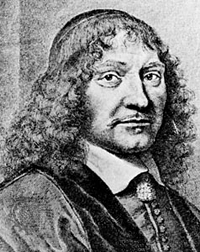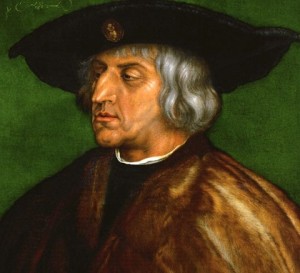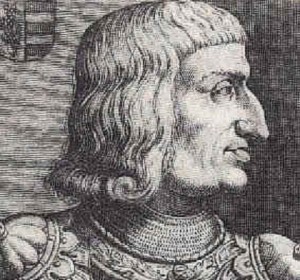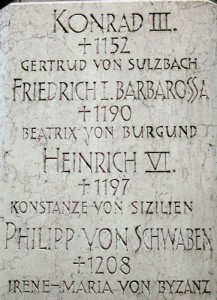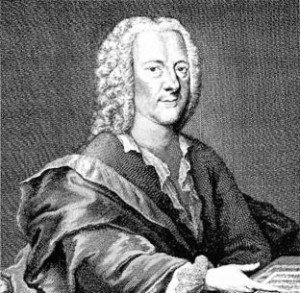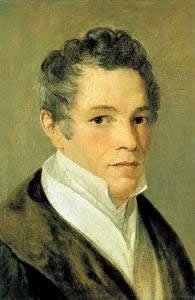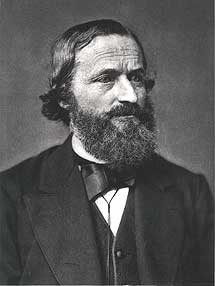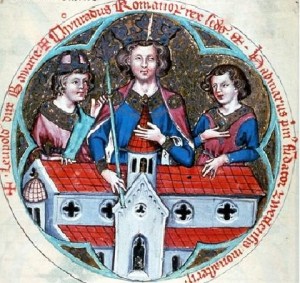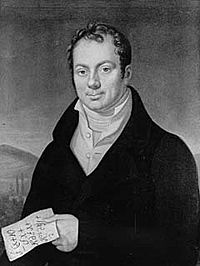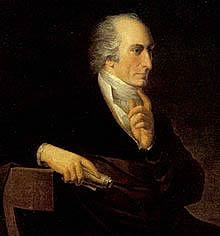March 15, 1614 Birth of Franciscus Sylvius (1614-1672) in Hanau, Germany. Sylvius was a physician who concluded that the basis of life and disease is chemical and that chemical compounds can be used to treat disease. In 1658 he began a teaching career at the University of Leiden. It was there that he constructed the world's first university … [Read more...]
The Protestant Reformation
On the eve of the Protestant Reformation, the institutions of the Holy Roman Empire were widely thought to be in need of improvement. The Habsburg emperors Frederick III (r. 1440-93) and his son Maximilian I (r. 1493-1519) both cooperated with individual local rulers to enact changes. However, the imperial and local parties had different aims, the … [Read more...]
The Empire Under the Early Habsburgs – Medieval Germany
The Great Interregnum ended in 1273 with the election of Rudolf of Habsburg as king-emperor. After the interregnum period, Germany's emperors came from three powerful dynastic houses: Luxemburg (in Bohemia), Wittelsbach (in Bavaria), and Habsburg (in Austria). These families alternated on the imperial throne until the crown returned in the … [Read more...]
The Hohenstaufen Dynasty, 1138-1254 – Medieval Germany
Following the death of Henry V (r. 1106-25), the last of the Salian kings, the dukes refused to elect his nephew because they feared that he might restore royal power. Instead, they elected a noble connected to the Saxon noble family Welf (often written as Guelf). This choice inflamed the Hohenstaufen family of Swabia, which also had a claim to the … [Read more...]
March 14 in German History
March 14, 968 Death of St. Mathilda (ca. 895 - 968). St. Matilda, the wife of the German king Heinrich I was born in about 895 in Engern, Saxony, Germany. Matilda and King Heinrich married in 909. She was the mother of Otto who would become the Emperor of the German Empire (a.k.a. Holy Roman Empire). Her son Bruno became the Archbishop of … [Read more...]
March 13 in German History
March 13, 1741 Birth of Joseph II in Vienna, Austria. The Habsburg, Joseph II was the Holy Roman Emperor from 1765-1790. Until Maria Theresia's (his mother's) death in 1780, Joseph ruled attuned to her strong advice. He strengthened the University of Vienna, introduced a universal code of civil law in 1786, ordered the end of serfdom, granted … [Read more...]
March 12 in German History
March 12, 1821 Birth of Luitpold in Würzburg, Germany. Luitpold was the third son of Ludwig I. During the reign of Ludwig II ("Mad King Ludwig" who built the wonderful castles) he served as regent. He introduced liberal democratic structures into Bavaria and did much to establish Munich's position as a cultural center. Luitpold, Prince … [Read more...]
The Salian Dynasty, 1024-1125 – Medieval Germany
After the death of the last Saxon king in 1024, the crown passed to the Salians, a Frankish tribe. The four Salian kings--Conrad II, Henry III, Henry IV, and Henry V--who ruled Germany as kings from 1024 to 1125, established their monarchy as a major European power. Their main accomplishment was the development of a permanent administrative system … [Read more...]
March 11 in German History
March 11, 1780 Birth of August Leopold Crelle (1780-1855) in Eichwerder, Germany. Crelle was a mathematician who founded the prestigious journal, Crelle's Journal (original name: Journal für die reine und angewandte Mathematik) in 1826. March 11, 1850 A constitution is adopted in Prussia. March 11, 1894 Birth of Otto … [Read more...]
March 10 in German History
March 10, 1503 Birth of Ferdinand I in Alcala de Henares, Spain. The Spanish born Habsburg, Ferdinand, would become the Holy Roman Emperor, and the king of Bohemia and Hungary. In the "Peace of Augsburg" of 1555 he agreed to the right of regional princes to determine the religion of their own territories. March 10, 1615 Death of St. John … [Read more...]
- « Previous Page
- 1
- …
- 110
- 111
- 112
- 113
- 114
- …
- 139
- Next Page »
